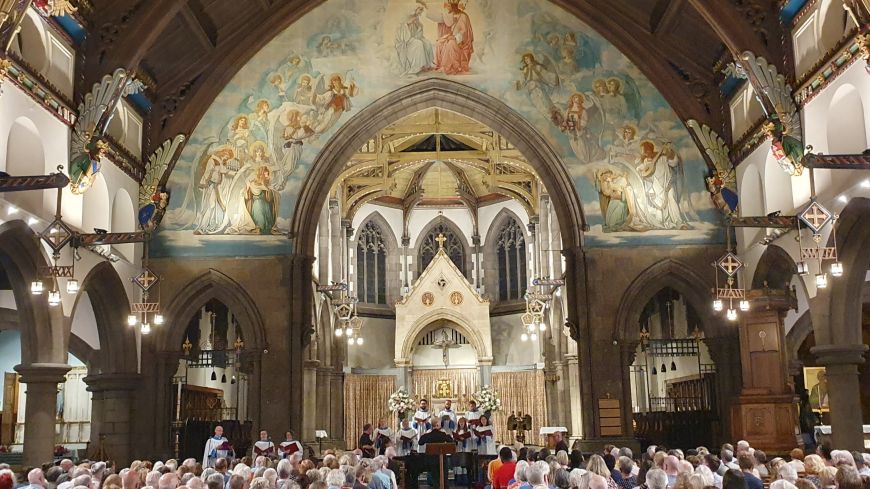
‘Faith in the Footlights’ sought to bring together some of most favourite songs from the musicals, though with refreshing commentary about the spirituality that lay behind them: an interfacing of sacred music and the message of the musicals.
Ian Bradley gave an extended but enthusiastic introduction to the evening, the first half of which was entitled ‘Singing nuns & rabbis – Broadway does religion!’ The opening clue could immediately seen in the Preludium – evidencing the fact that Rodgers had actually spent a great deal of time and effort to understand the liturgical: spending substantial time at a New York convent himself to familiarise himself with monastic routine.
‘Climb every mountain’ is probably the most well-known song from ‘The Sound of Music’, and Emily Zehetmayr led with a mesmerising solo. The musical in general probably presents the most sympathetic portrayal of the religious life – though mirrored by ‘Fiddler on the Roof’. Here, a different context: a Jewish community under persecution. But, like the ‘Sound of Music’, it has its own distinct liturgical elements. The ‘Sabbath Prayer’ could easily have been sung in a Jewish household or synagogue. Similarly, ‘If I were a Rich Man’ was inspired by a much earlier Yiddish monologue – this (again) would have been well-researched, preserving the air of authenticity.
Back to Rodgers & Hammerstein, and ‘Carousel’ for the concluding piece of the first half: ‘You’ll Never Walk Alone’ – where the doctor addresses the high school graduates. Here, we see more of Hammerstein’s background, him being highly influenced by the Liberal Protestant tradition. The work retains something of a hymn-like character, and here it was sung as a solo (Maria Campbell) as originally set, before breaking out into fuller harmony.
In the second half of the recital, there was a focus on Andrew Lloyd Webber. With a private chapel within his own estate, Webber has been a quiet high-Anglican, and the theme of spiritual yearning pervades a lot of his works. Following ‘Any Dream will Do’, the Requiem piece ‘Pie Jesu’: originally written in memory of his father - the impact of the English choral tradition on Webber shining consistently through.
His best known work is surely ‘Phantom of the Opera’. Though not immediately thought of as ‘spiritual’, there is the unambiguous religious ‘angel’ motif, played out in an unmistakeably biblical way: themes of temptation, redemption and forgiveness – and the turning from loathing into love. Something also ecclesiastical about the Phantom’s lair – with its organ, gothic design and candles… though with darker dimensions too – which ‘In sleep he sang to me’ encapsulated.
Webber also wrote ‘Whistle down the wind’ – it pivots on whether ‘the man’ is Jesus or an escaped convict. ‘No matter what they tell us’ is about the innocent belief of a trusting and childlike simple act of faith, versus the more adultlike inclination towards ready dismissal and instinctive cynicism.
We concluded with maybe the most explicitly Christian musical of the last 50 years: Les Misérables. ‘Bring him home’ is a stately hymn-like progression (often employed nowadays as a prayer at funerals); and, appropriately, the conclusion was ‘Do you hear the people sing’ – which we were all invited to join in with at the end.
The performance finished at 9.40pm.
Faith in the Footlights, Tuesday 12th August 2025, St Mary’s Metropolitan Cathedral

